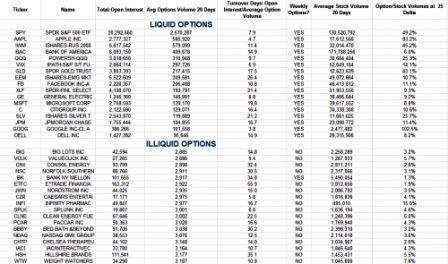MarketsMuse.com Strike Price update strikes at the heart of how the financial industry’s new regulatory regime is impacting liquidity across the institutional options market, courtesy of 09 April coverage by MarketsMedia.com.
![]() Regulatory requirements that dealers keep more capital on their balance sheets is squeezing options liquidity for institutional traders, who buy and sell the equity derivatives to generate alpha and hedge long- and short-term exposures in their portfolios.
Regulatory requirements that dealers keep more capital on their balance sheets is squeezing options liquidity for institutional traders, who buy and sell the equity derivatives to generate alpha and hedge long- and short-term exposures in their portfolios.
“The regulatory environment is affecting liquidity and pricing for investors in option markets,” said John Burrello, senior trader at Invesco. “Basel III, Volcker, and Dodd-Frank have made broker-dealer balance sheet capacity more expensive – and that is being passed onto investors through wider bid/ask spreads and less capital commitment.”
The introduction of the leverage ratio – which has a target ratio of 3.0% under Basel III – is a hallmark risk-based capital requirement. Starting in 2015, banks will be required to disclose the leverage ratio, with a view to migrating it to a Pillar 1 requirement by 2018 after a final calibration
Basel III will have a significant impact on banks and force changes in the way trading and prime brokerage desks operate. Although these measures are aimed at the banking sector specifically, repercussions will be felt throughout the network of market and counterparty relationships which make up the global financial system.
This is especially true for investors looking to hedge longer-term exposures, “because dealers have to tie up that risk on their balance sheets,” said Burrello. “It has also affected even short-term tail hedging, because dealer stress-tests account for potential capital needed to take the other side of downside tail events.”
At the same time, custodians and prime brokers have started asking clients to hedge tail risk more aggressively in order to avoid increased collateral requirements. “As in other markets, like treasuries and credit, equity options could potentially become less liquid as a result of decreased broker-dealer balance sheet capacity,” Burrello said.
For the entire story from MarketsMedia.com, please click here

